|
Play List: 4. Corinne 7. The Mormons 9. Lucy Brandon 10. Storm-Beaten 11. Lady Clare 13. Bachelors 14. Constance 15. Lottie 16. Agnes 17. Alone in London 18. Sophia 19. Fascination 20. The Blue Bells of Scotland 21. Partners 24. Angelina! 25. The Old Home 26. A Man’s Shadow 27. Theodora 29. Clarissa 30. Miss Tomboy 32. Sweet Nancy 33. The English Rose 36. Marmion 37. The Gifted Lady 38. The Trumpet Call 39. Squire Kate 40. The White Rose 42. The Black Domino 44. The Charlatan 45. Dick Sheridan 47. Lady Gladys 48. The Strange Adventures of Miss Brown 49. The Romance of the Shopwalker 52. Two Little Maids from School ___ |
|
ROBERT WILLIAMS BUCHANAN (1841 - 1901) |
|
|
|
|
|
|
|
|
JAMES KENNEDY
In June, 2017 I received an email from Judy Denison of Colorado, informing me that she was the great-granddaughter of the Scottish/American poet and engineer, James Kennedy. Until that time my only information about the links between Kennedy and Buchanan were the two poems that the former wrote about the latter. The first was written on the occasion of Buchanan’s departure back to England after his, almost a year’s, stay in America. The second was written after Buchanan’s death. However, Judy informed that her great-grandfather had named his only son, born on 23rd August, 1885, Robert Buchanan Kennedy. She also sent me a copy of a letter from Buchanan to Kennedy, written shortly after Buchanan arrived back in England. All of these items, the poems and the letter, are in their relevant sections of the site, but I thought it made sense to bring them all together on this page, along with some biographical material relating to James Kennedy and his son Robert, which Judy also kindly provided.
The Poems
LAMENT ON THE OCCASION OF THE DEPARTURE OF ROBERT MY Muse fu’ dowie faulds her wing, O Rab was bright an’ warm an’ free, O blythe it was I trow to trace The puir newspaper chields may mourn, Play-actor billies round him hung, The lang-haired literary louns O when he met wi’ men o’ spirit, That day he gaed on board the ship, Quo’ I, wi’ heart as saft as jeel, Sin’ syne I muse on Fortune’s quirk: But whiles round Friendship’s wreathéd urn JAMES KENNEDY (From The Deeside Lass, and other Poems (Aberdeen: Cormack & Co., 1888). Reprinted in The Scottish and American Poems of James Kennedy (New York: J. S. Ogilvie Publishing Company, 1899, p.59-61) available at the Internet Archive.)
The Glasgow Herald (23 February, 1889 - p.9) We have been told that the Scottish lark, though transported to America, sings the same song that he lilted over the meadows of Doon or Dee. It is the same with the Scottish poets who take wing to the West. When the singing mood seizes them all America vanishes, and they are back in the old country again—it is “Scotland yet.” Such a poet is James Kennedy, whose new volume, “The Deeside Lass, and other Poems,” republished in Aberdeen by Cormack & Co., has all the air of being a home product. he is a fine, kindly, pawky chiel, Mr Kennedy; and it is pleasant to hear him sing as if he were sitting under the gleaming eye of the Scottish Lion, and not under the voluminous folds of the star-spangled banner. We don’t care so very much for his “Deeside Lass,” though it is a clever poem in its way. But his lyrics are rich gushes of music in the “guid auld Scottish style.” Among these “The Mournfu’ Mither” is excellent, so, as a bit of humour, is “Mactavish’s Feast,” with its huge haggis. There are some fine bits of hearty Scotch verse in “The Lament on the Departure of Robert Buchanan,” who visited America a few years ago, and made many friends, Mr Kennedy among the rest. The parting is good:— “That day he gaed on board the ship, “Quo’ I, wi’ heart as saft as jeal, That poetic prayer has not been in vain. Since that date Mr Buchanan has prospered; and there is not a kindly Scot in the world but wishes he may win still more prosperity and fame. ___
ROBERT BUCHANAN.
LET the bells of London toll Poet! in whose varied verse Wizard! from whose cunning hand Friend! where’er thy heavenward flight, (From The Complete Scottish and American Poems of James Kennedy (New York: J. S. Ogilvie Publishing Company, 1920, p. 171-172). _____
The Letter Westward Ho My dear Kennedy, I should indeed be churlish if I did not appreciate your fine lines on the unworthy theme of myself; they are as clever as they are complimentary, & you manage the Doric like a master. What specially endears them to me is the pleasure they gave to my dear mother, whose only fault is loving her son too much. I write this by the sickbed; for though she was well on my arrival & very happy in our re-union, she was yesterday taken suddenly ill with pneumonia, & for twenty four hours seemed at Death’s door. She is a little better now, & my poor heart is somewhat lighter. Unless God spares to me, I shall be a broken man; for since the earliest period of my remembrance, she has been the one sacred affection of my life. My days have been stormy & sad enough, & my fortunes often dire, but this one comfort has been left to me, & now it is all I ask. You may believe how cordially my heart goes to you, when I open it thus on a theme so sacred. I am grateful to you, my dear Kennedy, for your breezy sympathy & honest, simple, kindness, and shall ever be glad to hear from or of you. With even your reverence for literature & literary men I can sympathize, tho’ I cannot feel it; for in my eyes there is no thing under the sun worthy reverence save goodness & love – intellect is nothing – literature is nothing – save as they adumbrate what is diviner, & what the simplest nature may share with the highest. Intellect is like money – a minted coinage very useful for the affairs of this world – but compared with human sympathy, it is dirt & dross. But I need not say this to you, who have learned it long ago. When my mind is easier, & my heart less burthened, I will try to send you some books of mine which you may care to keep for my sake. I am glad you have been enjoying yourself with Charley Coote. He is a frank openhearted loveable fellow, honest to the core, with the rare quality of never pretending to any sentiment he does not feel; and he is clever, apt, & with insight, though not after the literary fashion. After all, is not the literary fashion a very poor one, compared with all the vital & strenuous fashions of life in general? But poetry in its essence is, as you rightly believe, the salt of the earth; not because of its literary quality, but because it sanctifies & spiritualizes the common dish of experience, & makes men love one another & believe in something higher than themselves. So highly does Providence value the mere gift of poetry, that she seldom supplements it with any other gifts; and indeed, it is all sufficient. Strife for Fame is another thing: an ignoble strife generally or very often. The poets God loves best are those man never crowns. Write to me as often you care to write; I shall always hear from you with pleasure, for believe me I am Always yours I am glad to hear that you were amused at Brooklyn. Of course the play is poor enough, but it serves its simple purpose. I think Coote’s performance most remarkable, & quite agree with you that he will make a great comedian if he perseveres. It was a good thing to have your kind face among the crowd, I am sure it brought us luck! _____
Biographical Materials
From Electric Scotland: |
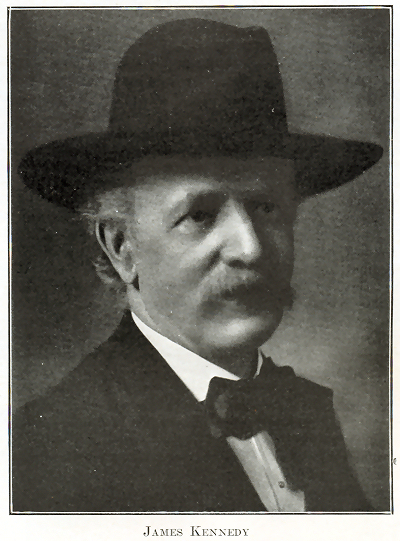 |
|||
|
JAMES KENNEDY, engineer, editor, author, poet, is from Aberlemno, Forfarshire, Scotland. The Forfarshire Kennedys are descendants of the Lochaber clan, 300 of whom fought at Culloden. On his mother’s side, Mr. Kennedy is descended from the Mackintoshes of Glenshee. He learned the machinist’s trade in Dundee, and came to America at an early age, and worked at locomotive construction and repairs on some of the principal railroads in America. In 1875, he was graduated with honours in the literary courses of the High School, West 13th Street, New York. He had charge of a department in the locomotive shops of the New York Elevated railroad from 1879 to 1902. In 1883, the first steam locomotive built at the company’s works, and from which the succeeding locomotives were modelled, was constructed under Mr. Kennedy’s superintendence. He was Chief Cashier in the Water Department of New York City, 1902-3, and Deputy Superintendent of Elections in 1904. He became associate editor of Railway and Locomotive Engineering in 1905, and advanced to managing editor in 1910. He is a contributor to periodical literature, and an author and writer on technical subjects. His Collected Poems, Songs and Lyrical Character Sketches were published in 1883; The Deeside Lass and Other Poems, in 1888; Scottish and American Poems, in 1899; and a revised and enlarged edition was published in Edinburgh, 1910 (seventh thousand). His chief engineering work is The Valve-Setter’s Guide, 1914 (tenth thousand). Mr. Kennedy is Vice President of the Angus Sinclair Publishing Company, 114 Liberty Street. Such is a brief outline of the career of one of the most unique and popular Scots of our time. In regard to his merits as a writer in verse in the Scottish dialect, he is conceded to be the chief of the modern Scottish poets, and has also shown an admirable facility in English. He is no idle jangler of the lute strings. A peculiar kind of worldly-wise humour gives point to his character sketches. His ruling passion as exhibited in his more serious verses is an intense love of Scotland, and all things Scottish, a faithful attachment to his adopted country, and an abiding belief in the brotherhood of humanity. His genius is essentially lyrical, and his mastery of versification at once easy and complete, and all the characteristics of true Scottish poetry—simplicity, tenderness, pathos and humour are found in his work. Time has deepened and broadened his poetic faculty, an excellent example being his nobly stirring verses on the occasion of the six-hundredth anniversary of the Battle of Bannockburn, which he delivered on the battlefield, and where he met a most enthusiastic reception, not only at Stirling, but at the Liberal Club, Edinburgh, and in the town Council of Dundee, and at other places in Scotland. Indeed, it must be said that the Scottish people at home and abroad, as well as the Scottish press, have not been slow in appreciating Mr. Kennedy’s surpassing abilities. In America, he has been engaged in the national and state elections, and has been prominently identified with the occasional reform movements in New York City, and through all these phases of literary and social activity he has never wandered far from his chosen vocation. As a skilled artisan, and mechanical engineer, he has made a distinctive mark, while his home life has been of the sweetest and best and he has had the good fortune to live in his own house for many years where his fine family has grown up around him. It is also good to know that among his engineering, political, literary and social acquaintances, he is held in the highest esteem. In journalism, he is associated with Dr. Angus Sinclair, the eminent author and publisher on railway engineering. In politics he has held many places with honour. Among literary men he has had the warmest encouragement from the highest and best. In the social circles he has been President of nearly all of the Scottish and other societies to which he has been attached. As a fluent and ready debater, as a teller of stories, as a finished parliamentarian, he has the easy grace of a man of the world, while the moral purity of his life has kept his heart sweet and young, and withal a manly modesty that lends a charm to his engaging personality. Mr. Kennedy married Isabella, fourth daughter of Francis Low, tenant of Easter Clune, Finzean, Aberdeenshire. Mrs. Kennedy died in 1910. There are five surviving children: Isabella, Jessie, Margaret, Robert and Jean. The only son, a staff surgeon, served with the rank of captain surgeon on the Mexican border in 1916. ___
From Scottish Poets In America, with Biographical and Critical Notices (1889), by John D. Ross (New York: Pagan & Ross, 1889 - pp.38-46): |
|||
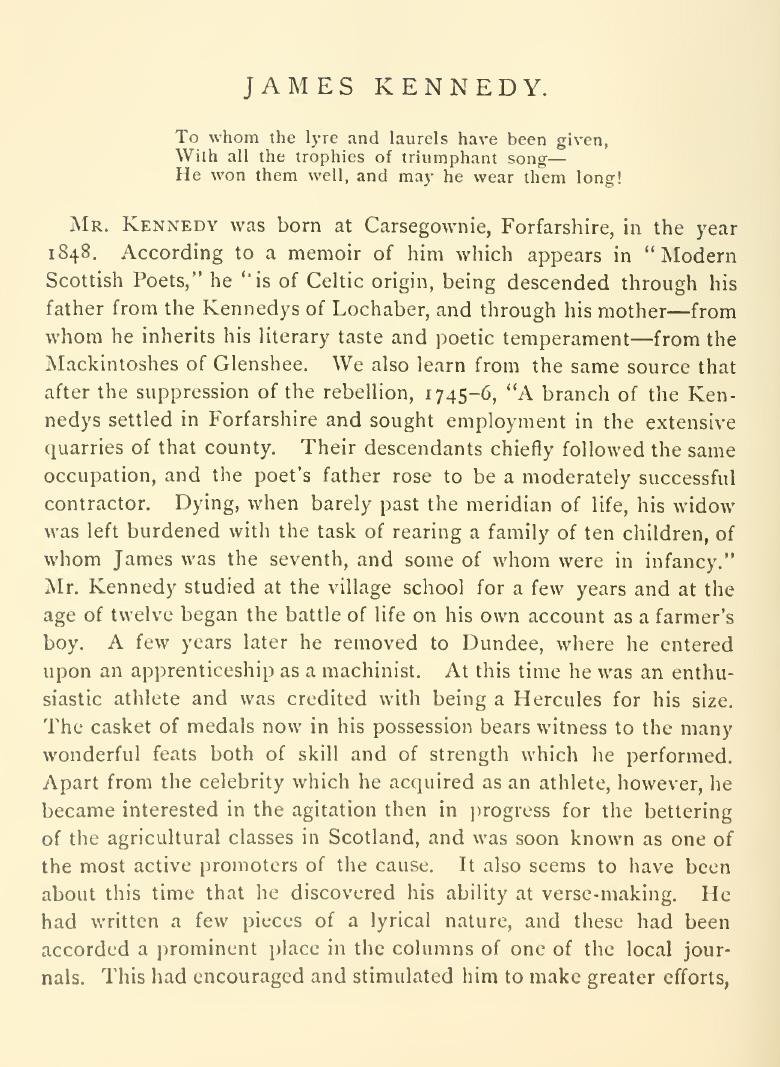 |
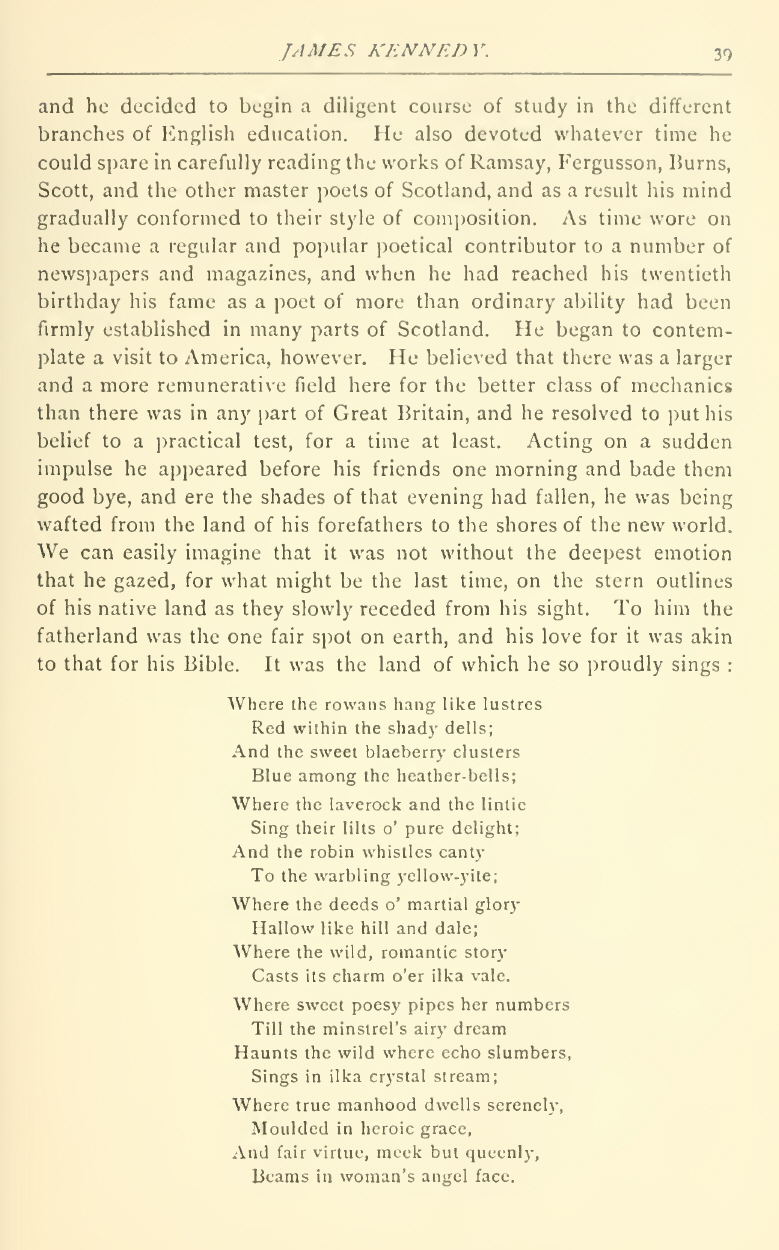 |
||||
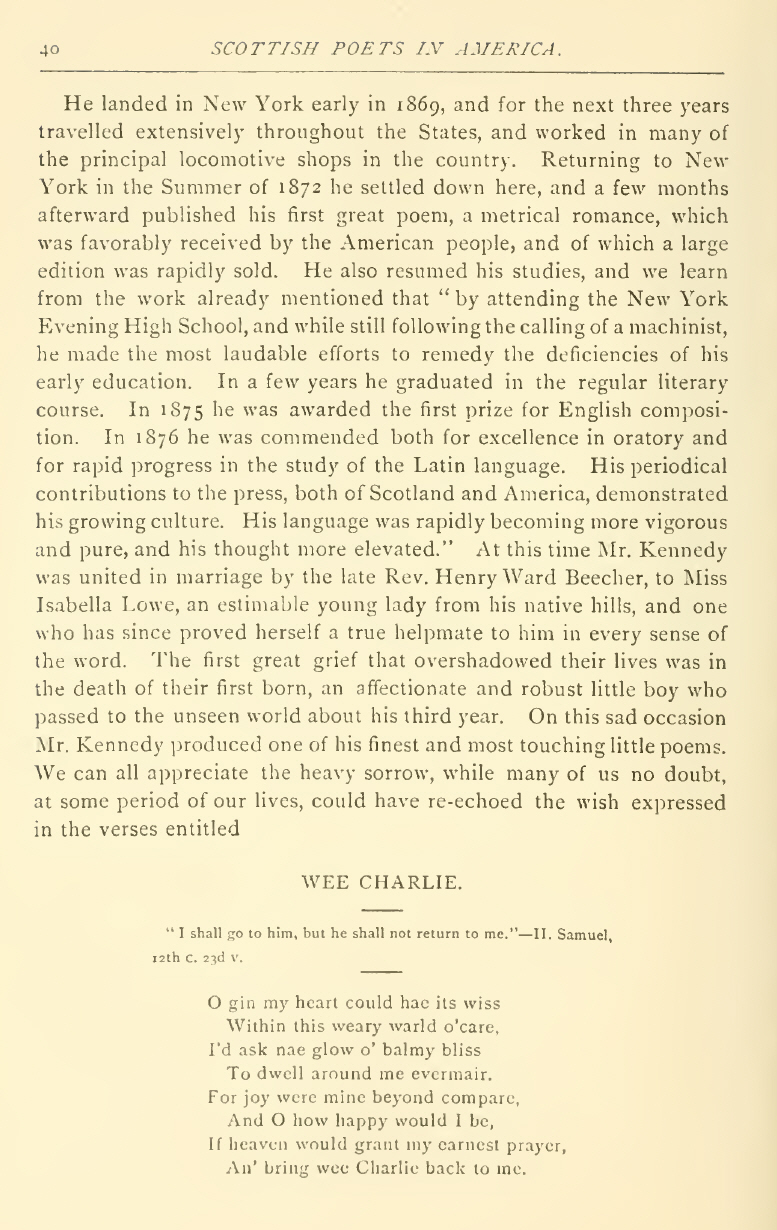 |
||||
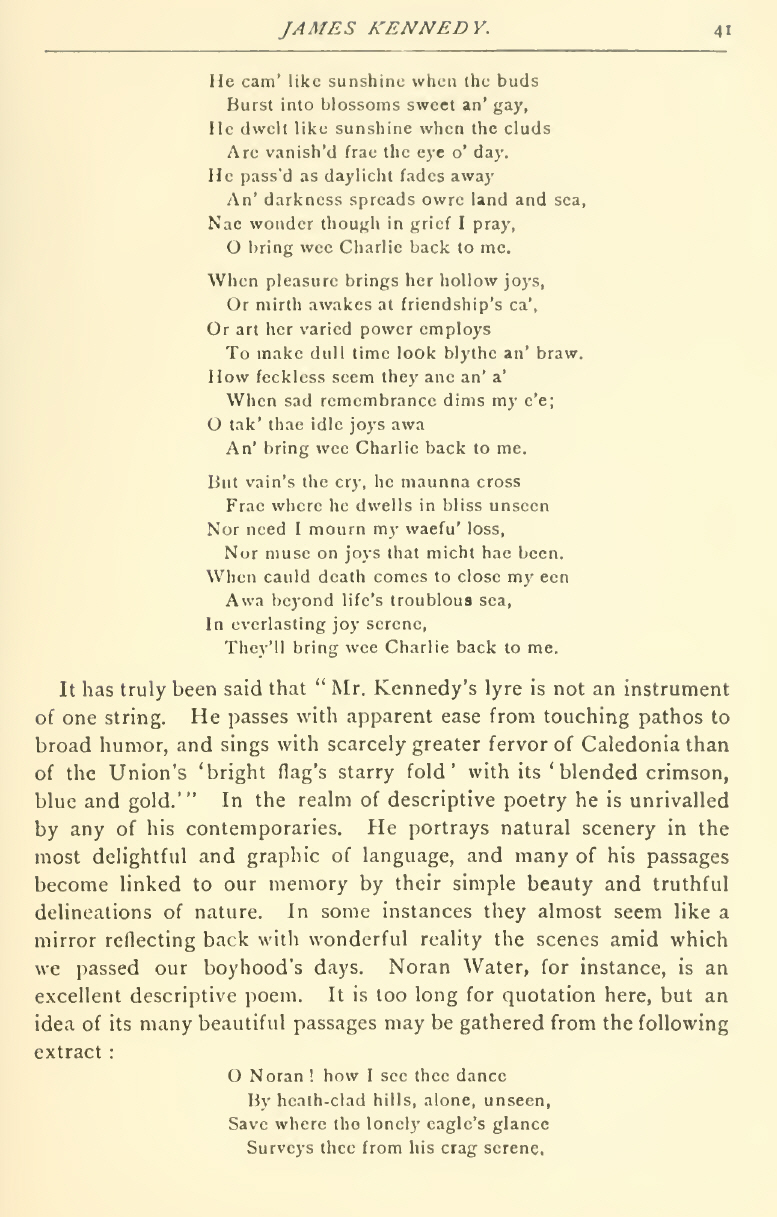 |
||||
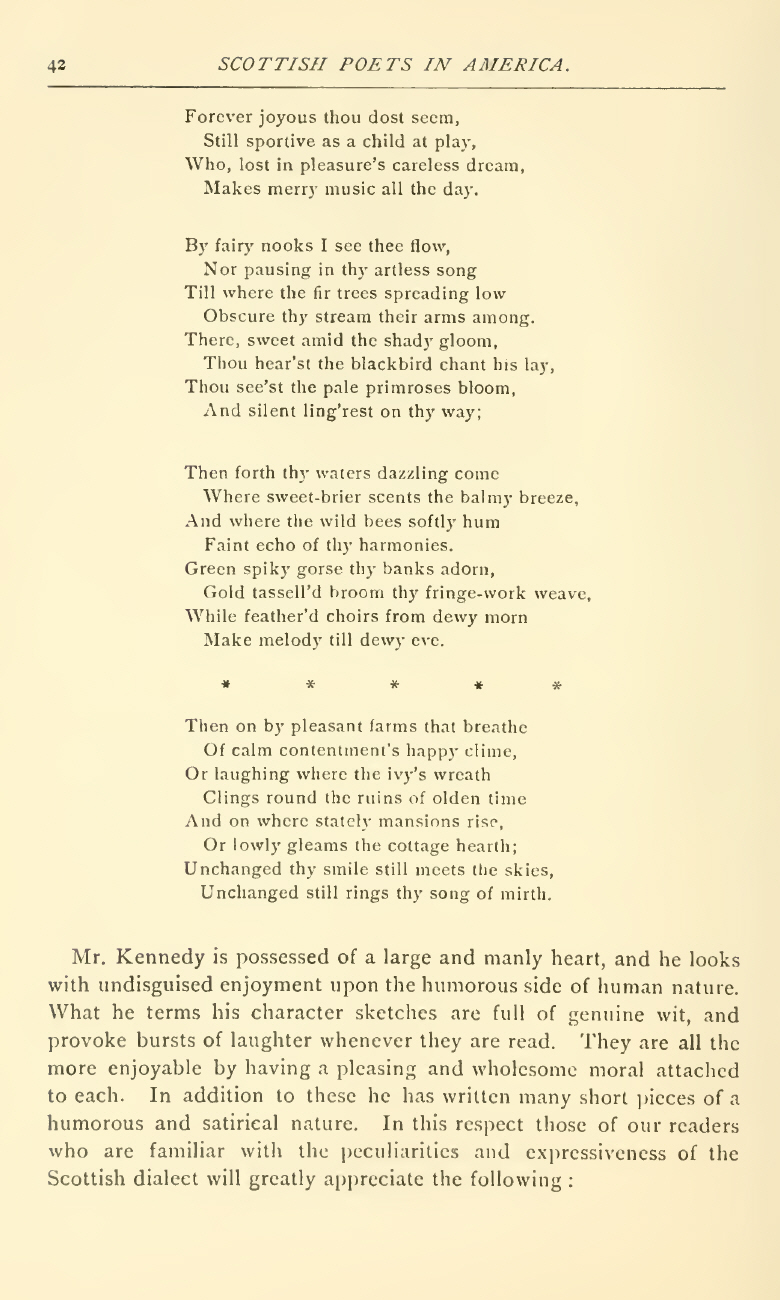 |
||||
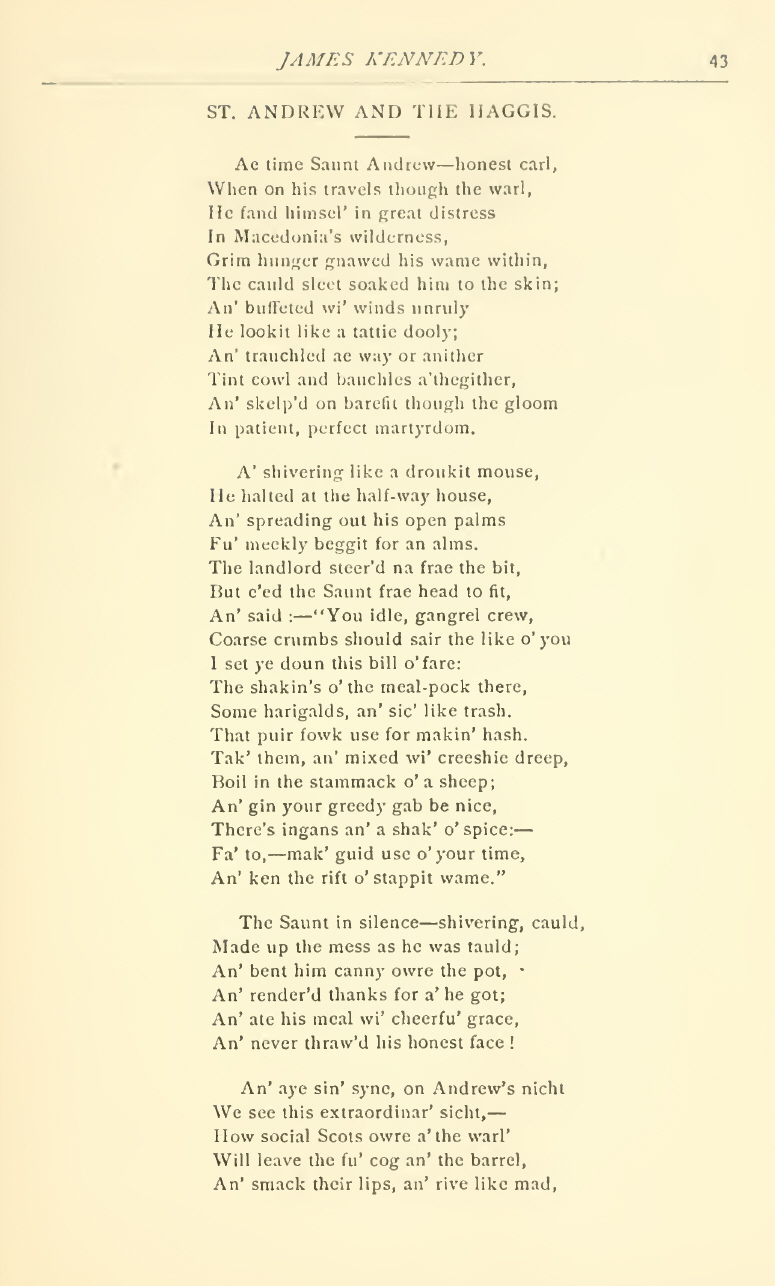 |
||||
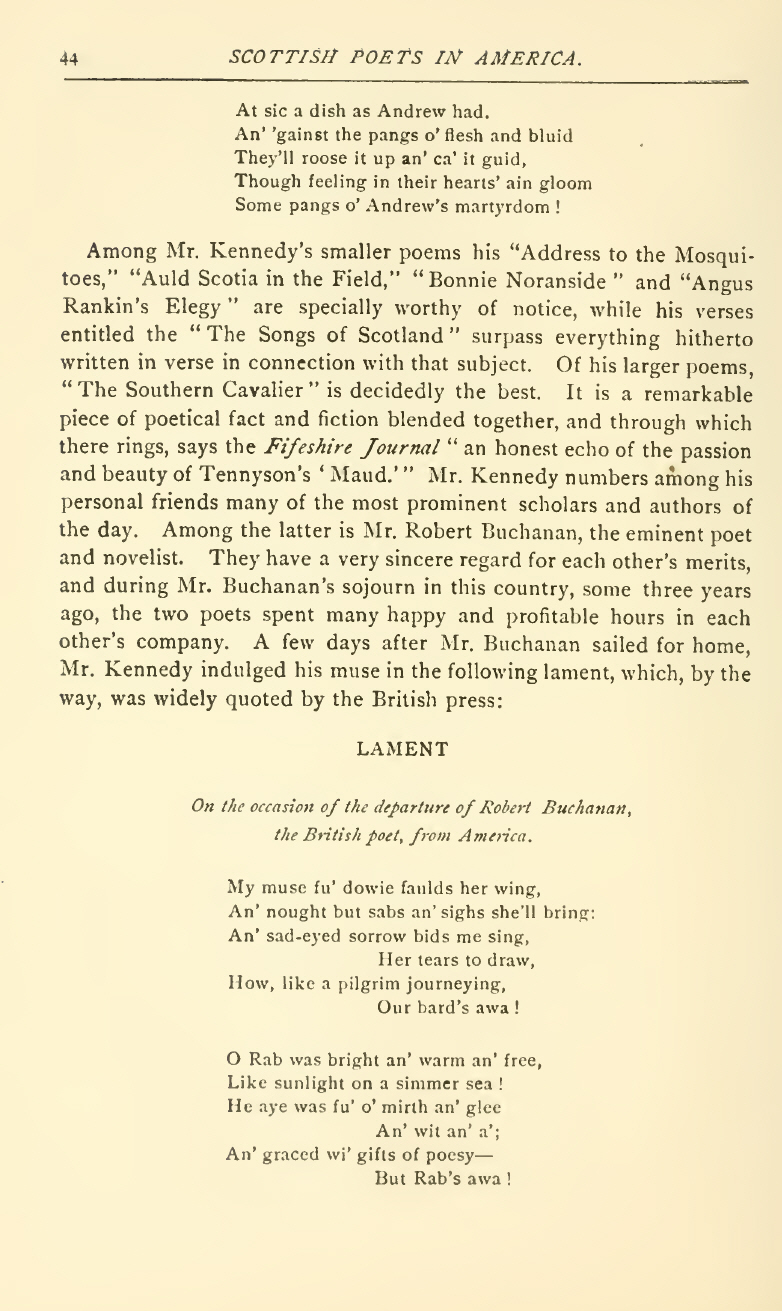 |
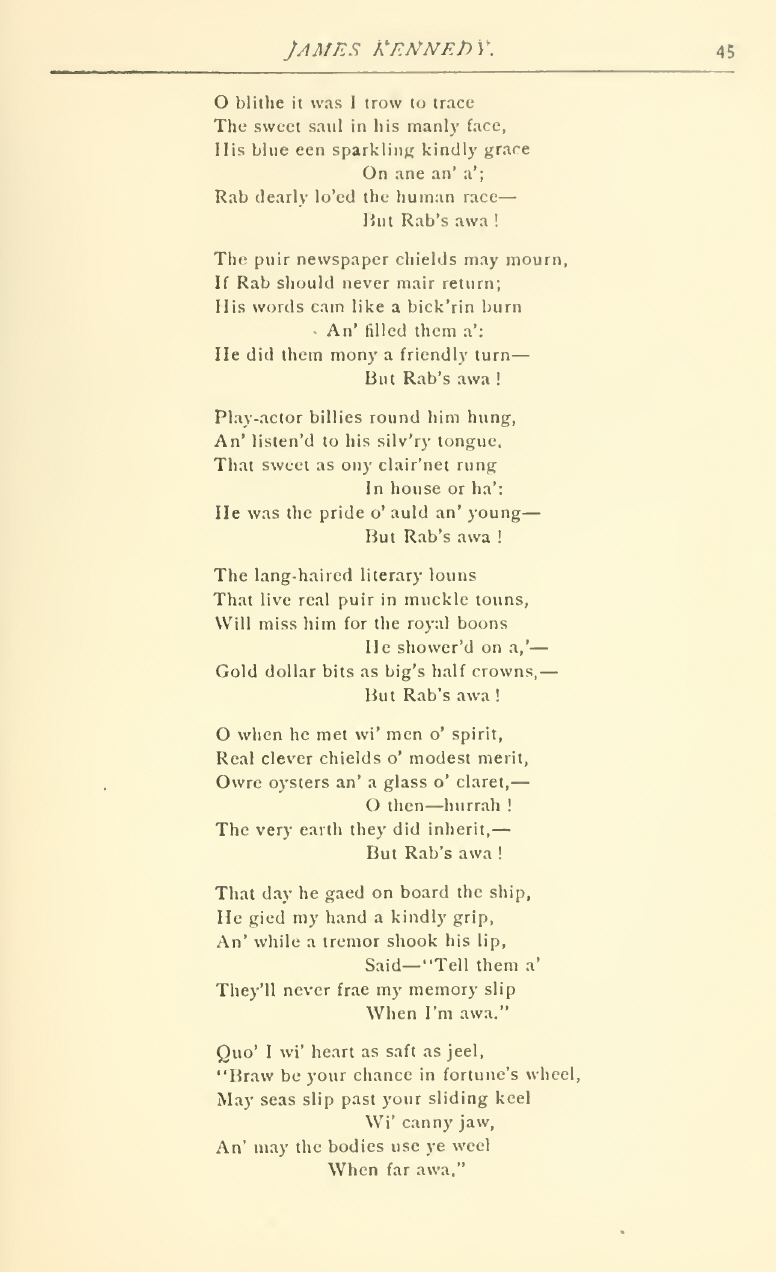 |
||||||||||
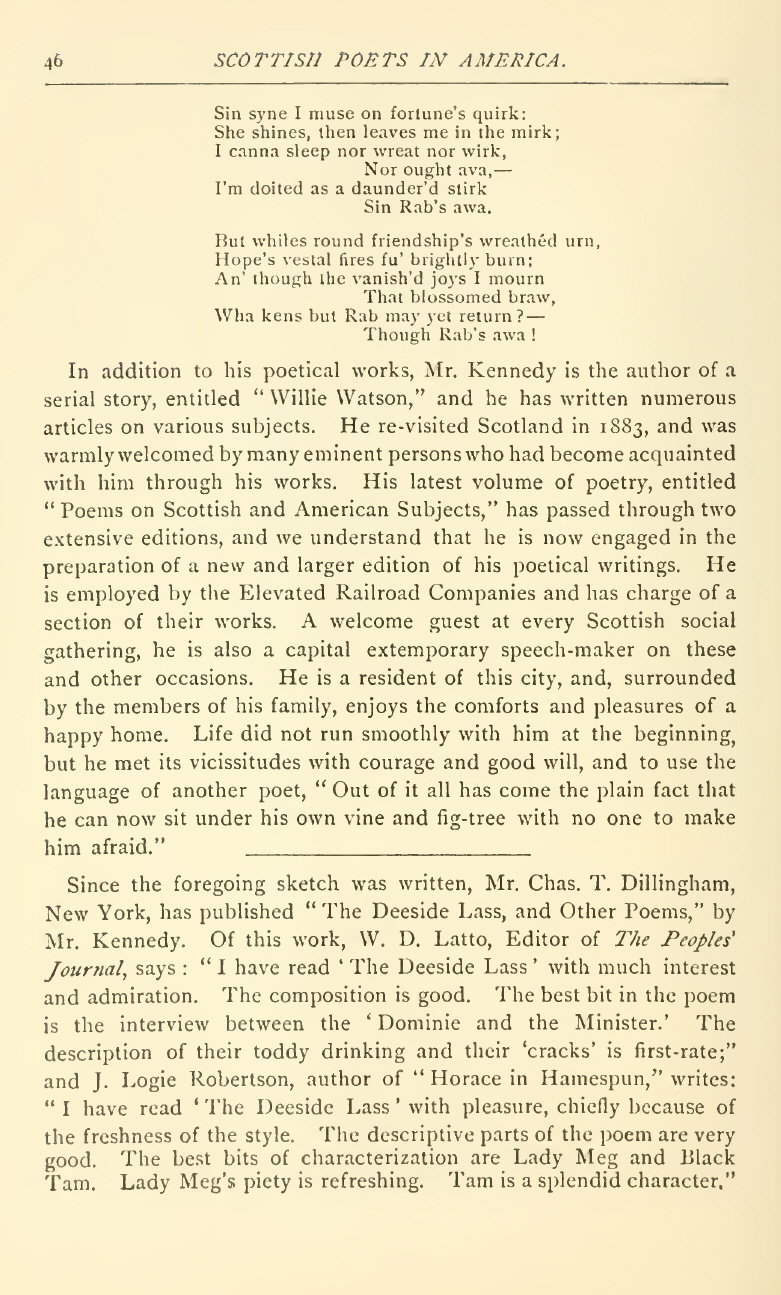 |
||||||||||
|
The New York Times (28 June, 1917 - p.11) |
||||||||||
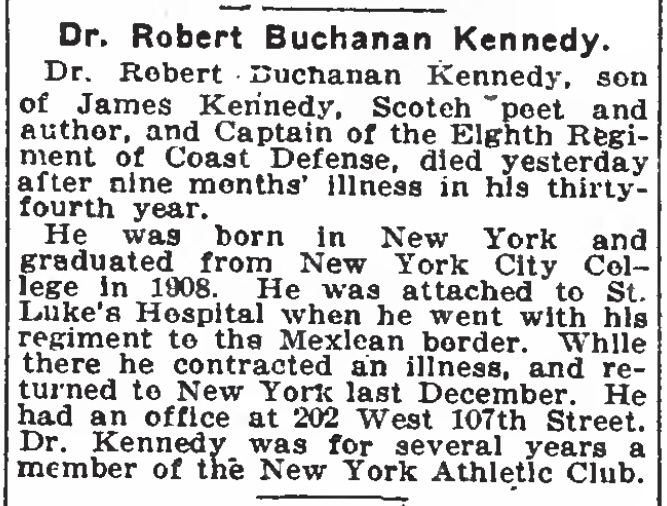 |
||||||||||
 |
||||||||||
|
The Caledonian (August, 1917 - p. 179) |
||||||||||
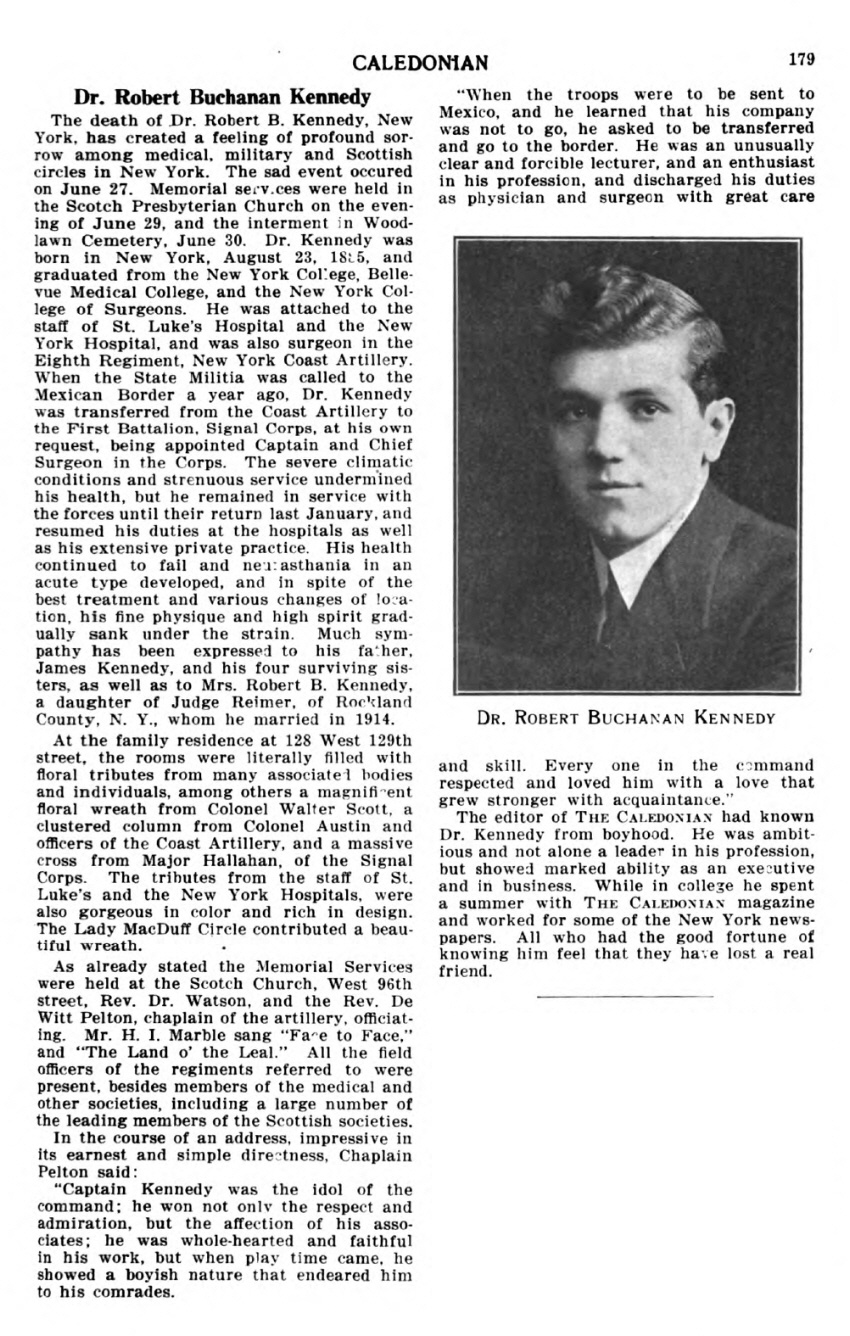 |
 |
||||||||
|
The New York Times (16 August, 1922) |
||||||||
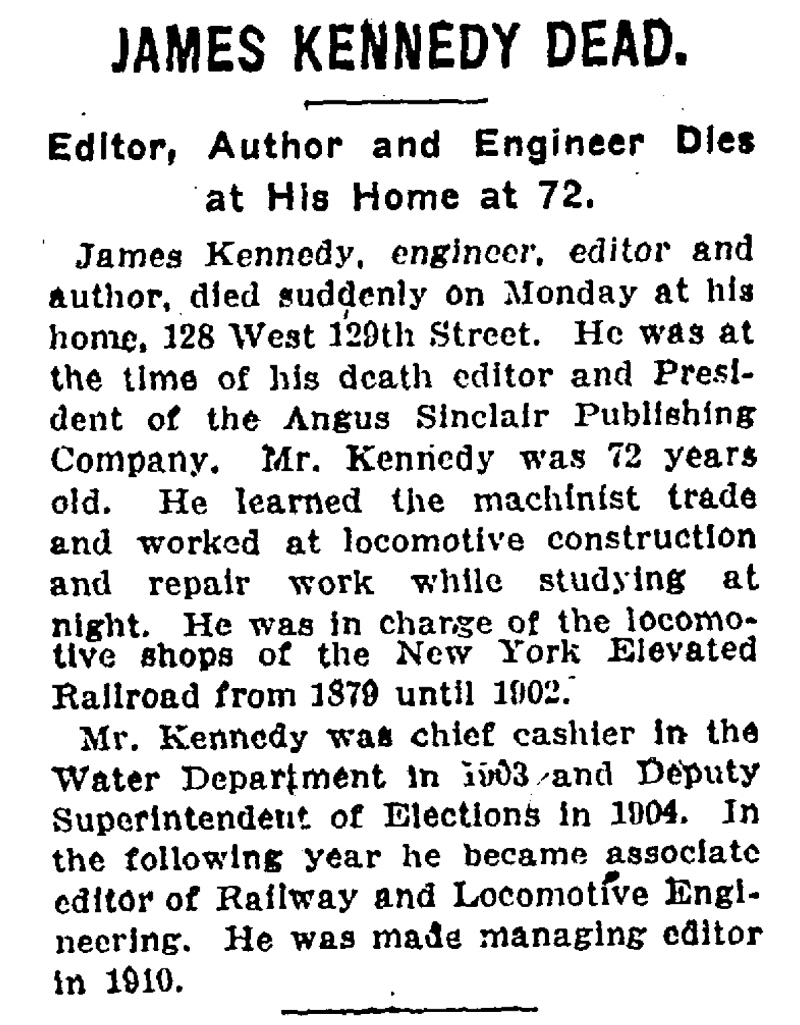 |
||||||||
|
The New York Times (17 August, 1922) |
||||||||
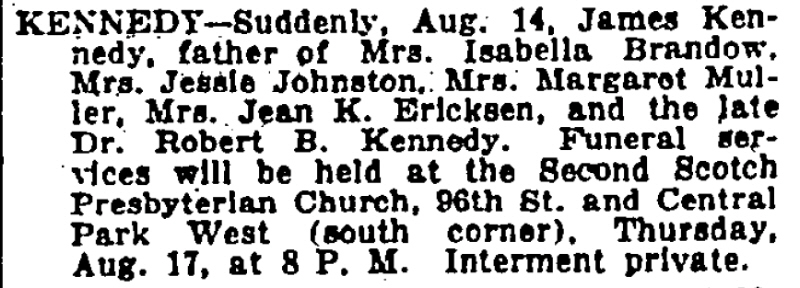 |
||||||||
|
The Caledonian (September, 1922 - pp. 174-177) |
||||||||
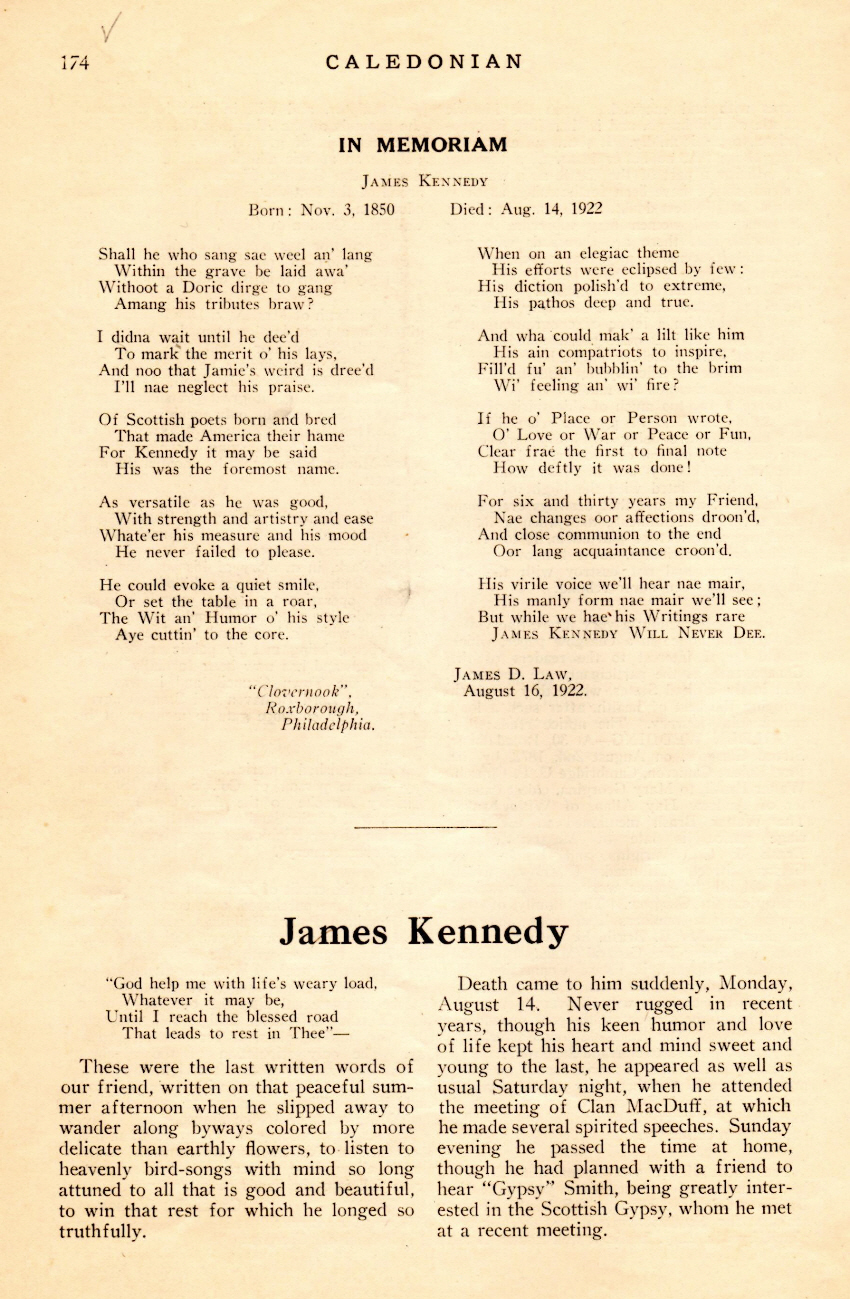 |
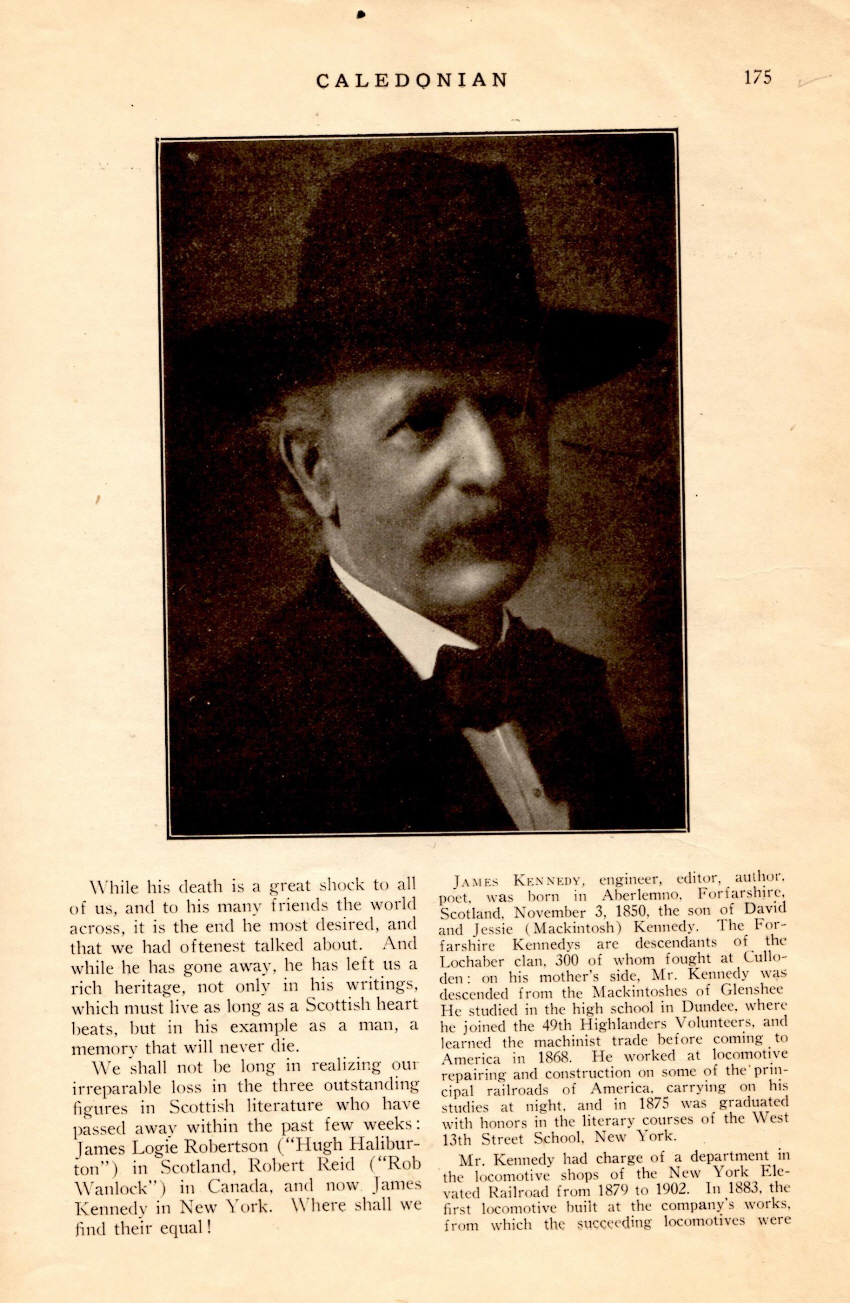 |
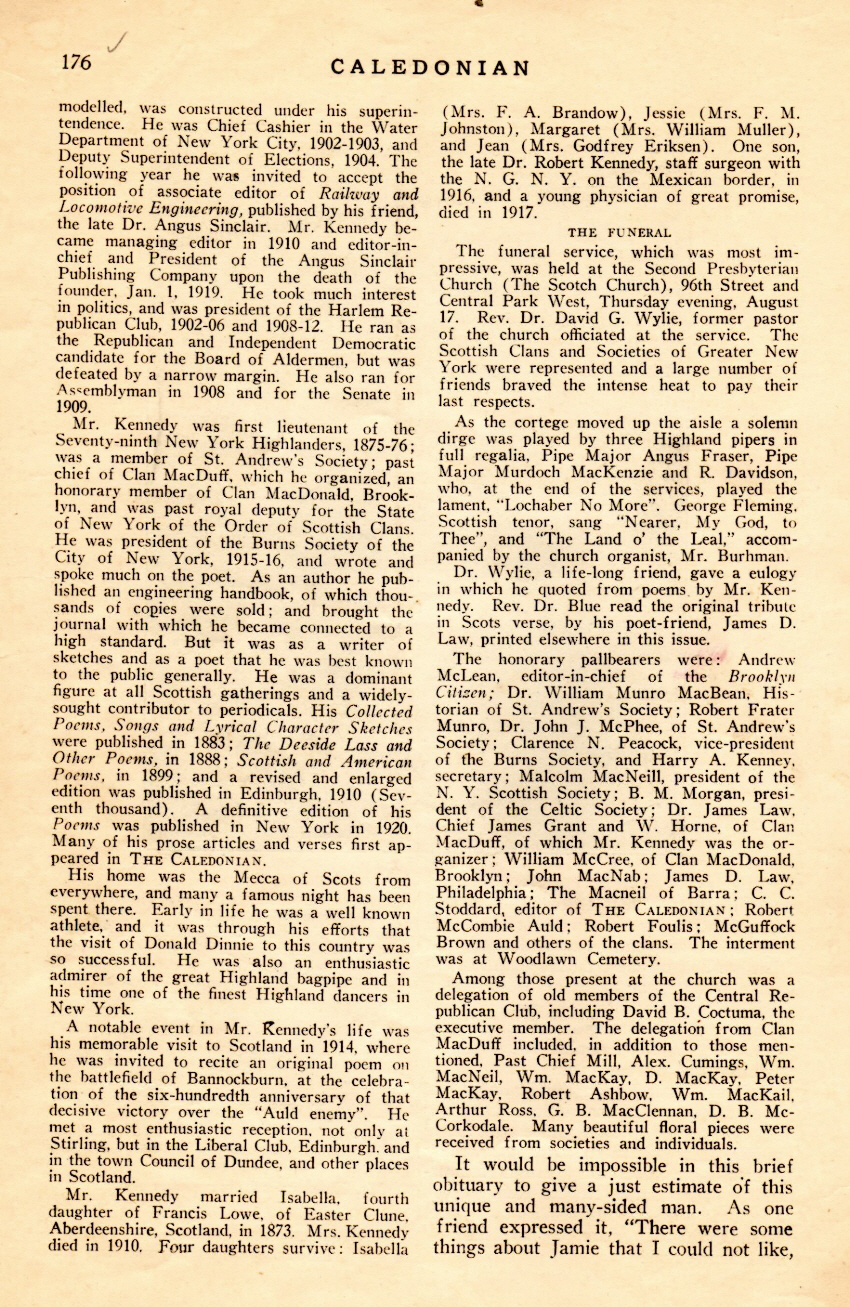 |
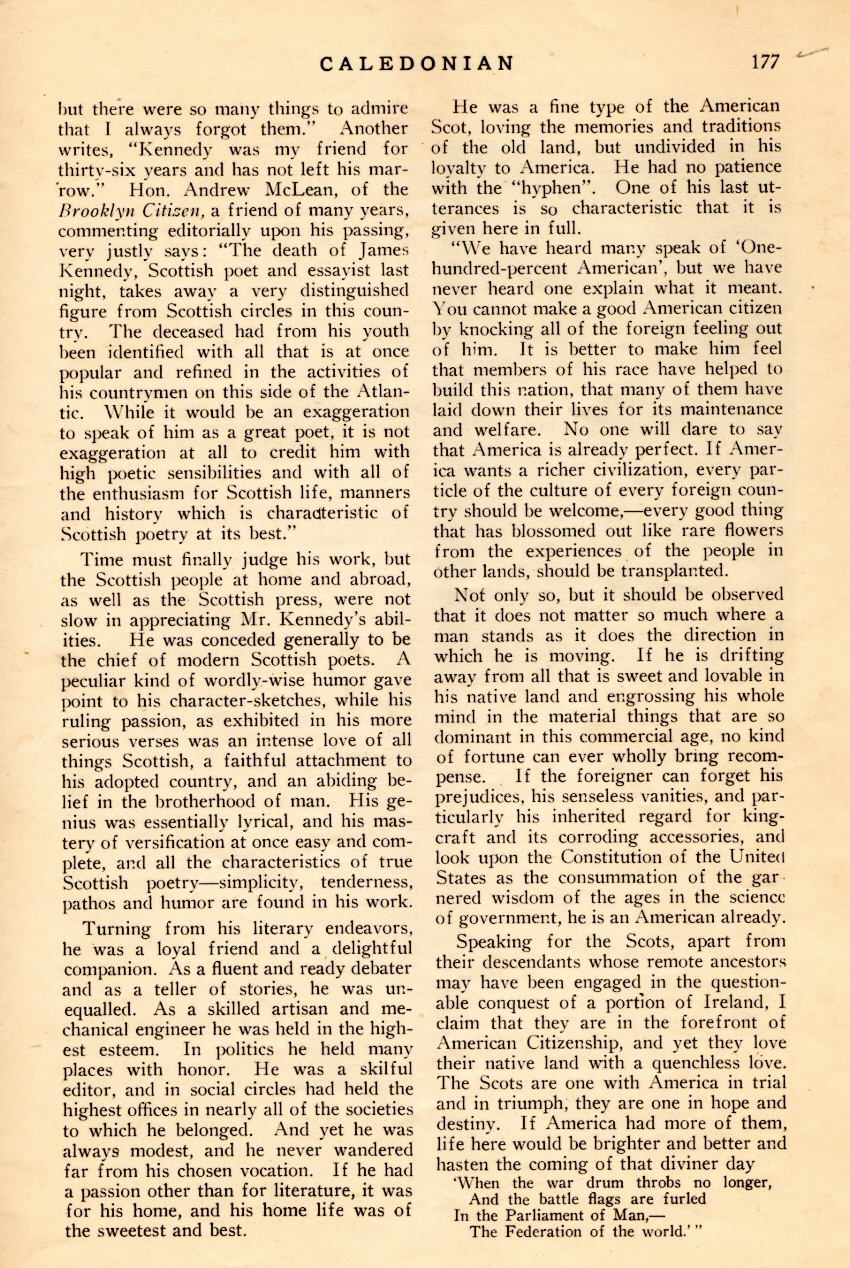 |
|
Back to Buchanan’s Theatrical Ventures In America 1884-1885 Robert Buchanan Obituaries or Random Letters
|
|
|
|
|
|
|